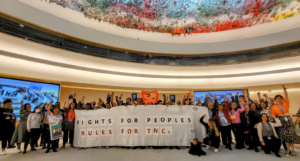United Nations negotiations for a Binding Treaty on Transnational Corporations and Human Rights
Our concluding joint remarks of the 8th session
I am Julia Fernandes, from the Movement of People Affected by Dams, and I speak here on behalf of the Global Campaign, the Treaty Alliance, ESCR-Net, the Young Friends of the Treaty, and members of the Feminists for the Binding Treaty.
The task that brings us all here is clear: make TNCs and other businesses enterprises (as defined by Resolution 26/9) accountable wherever they operate. At the outset, we maintain that asymmetry in legal systems is staggering: hard law benefiting corporations on trade and investment (like WTO Agreements, Investor-State Dispute Settlement mechanisms in BITs, FTAs); and soft law for human rights, like (UNGPs, OECD Guidelines). Corporations are able to use the gaps in international law for their benefit.
From the start, we, civil society organizations, social movements, Indigenous peoples, trade unions, women, gender-diverse people, human rights defenders, migrant and refugee peoples, and affected communities have participated actively in the negotiations: defending the important mandate of Resolution 26/9, proposing language, bridging differences of opinion, interpretation, and provisions – all in the spirit of attempting to close the huge gap in international law that allows corporations to evade accountability. The participation of civil society must be strengthened, and not curbed like during the session on conclusions and recommendations this morning where we weren’t allowed to be.
- We denounce yet again the lack of transparency and the regional imbalance of the so-called group of “Friends of the Chair”. The questions and demands that have been asked since the 7th session remain unanswered. We therefore urge the Chair to work on and propose clear criteria and procedures for the selection of members to this group; to clarify its role and mandate, and to ensure that the deliberations and suggestions resulting from its work be submitted and discussed within regional groups in the intersessional period. Moreover, concrete consultative mechanisms need to be ensured in order to allow meaningful civil society participation.
- We, alongside many States committed to the process, have also continuously denounced the textual proposals of the Chair. During the session, the Chair tried to legitimize these supposed informal proposals by putting them side by side with the 3rd revised draft. We repeat: the third revised draft, a document built upon 7 years of negotiations and based on states’ and movements’ contributions, is the only legitimate working document to be negotiated.
- We are aware of the strategies that the TNCs and OBEs and their representatives and political allies are putting forward. First, they tried to undermine the process saying that there was no need for binding regulations; second, they try to deepen the asymmetry between Global North and industrialized countries, domicilie of the majority of transnational corporations and other businesses enterprises (as defined by Resolution 26/9), and Global South and all the marginalized communities, where their operations violate human and environmental rights.
- This is a human rights treaty. It cannot accommodate corporate interests. This treaty is meant to hold transnational corporations accountable for the human and environmental rights violations committed.
- We reiterate our strong opposition to the participation of corporations in this process. No entity with commercial vested interests should be allowed to participate here, we will not allow the corporate capture of this process.
- We welcome the active participation of many States that have been engaging constructively and in good faith the entire week, defending the mandate of resolution 26/9 and pushing for a strong and effective Binding Treaty. We urge other States to find the political will to come on board and take the initiative to address the urgent needs of affected people and communities and our planet.
- The conclusions and recommendations adopted at the 8th session confirmed that many challenges remain ahead and that states must continue negotiating based only on the third updated revised draft.
We end here with a promise: the 5 networks here reunited will bring the results of this session to our territories, to the affected communities, to all organizations and movements that watch closely this process, and fight daily so that corporations don’t continue to enjoy impunity for their crimes. Next session, we will be here, pushing for a strong and effective binding treaty yet again.

